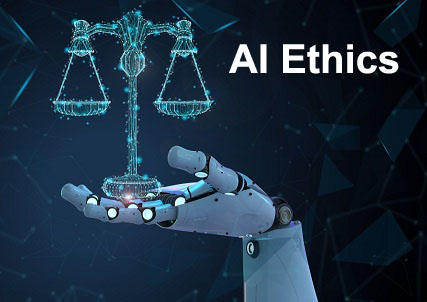Ethical issues around AI
As AI has gained so much power that can change the lives of people. We need to have ethics into a certain piece of AI, is being developed. We need to monitor/check/police the outcomes of that specific piece of technology in order to fully understand its behavior and make sure that it's not violating our (human) moral principles.

Ethical issues during AI Setup
- Bias (पक्षपात) and Fairness: There may be a chance of adding biasness to the AI-enabled machines during developing, either by the develpers or by the training data.
For example: AI system designed for recruitment must not be biased against gender, colour, religion etc. It should be free from all such things and be totally fair. - Accountability (जवाबदेही): A question is raised in everyone's mind that Who would be accountable for making mistakes by the AI system?
For example: If an autonomous Tesla car hits someone, then Who was blamed for it - that car itself, a person inside the car or the developers/testers of the car? - Transparency (पारदर्शिता): Transparency means everything that AI performs is explainable. It must explain all the information and knowledge that can be used by AI system. Such information includes what data is used, why that data is used, how that data is used, which models are used etc.
Ethical issues of AI Actions
- Safety: The implementation and practices for AI technology must be safe and ensure the well being of individual person as well as public welfare. It must hold the trust of users through the responsible use of technologies.
- Human AI Interaction: With the evolution of AI, Humanoid robots are much similar to the human or other living beings in appearance and actions. Therefore, there may be a chance to violate (उल्लंघन करना) the human dignity (मर्यादा / शान) in any way.
Thus, AI must not deceive (भ्रमित करना) humans (or any other living beings). - Cyber Security and Malicious use: Nowadays, AI tools can be used to determine the possible threats to cyber security. AI uses big datasets to determine futuristic threats and to test system's vulnerabilities (weak holes).
But you just think that if such AI tools become available to the wrong hands (like hackers/terrorists), they will distroy the whole security. Thus, it is the ethical responsibility of an organisation to have human control over AI usage so that it will not available to hackers for malicious use. - Trust, Privacy and Control: With the rapid development of AI technology, "Deepfake" technology make what once was reliable evidence into unreliable evidence through digital photos, sound recordings, videos etc.
Deepfake is a technology that can generate fake digital photos, sound recordings and videos, which look just as original as possible. Thus, it is the ethical responsibility of the creater and user of AI to ensure that these are not misused.
Ethical issues on AI Impact
- Automation and Impact over jobs: Use of AI-enabled machines like robots increased automation in each and every field and replacing humans too. Therefore, it impacts over jobs.
Actually, the use of AI does not mean that the jobs are reduced, it means the nature of jobs is changing. Thus, it is the ethical responsibility of an organisation to upgrade the skillsets of their workers to meet the AI futuristic jobs.
Also, it is the ethical responsibility of our government to bring appropriate changes in the education, trainings and opportunities for the people.
Ethical issues for AI future
- Human Right vs Use of AI: In many cases, use of AI becomes a threat on human rights.
For example: People share every moment of their lives through social media platform, AI can analyse all these data to make available to the government but also to potential advertisers. This become a huge risk to data privacy and protection i.e. Violation of human right to privacy.
Other such cases like - AI can analyse huge symptoms datasets of a person and can predict possible future ailments and disease. Using such analyses, a health insurance companies may deny insurance to people i.e. Violation of human right to affordable healthcare.